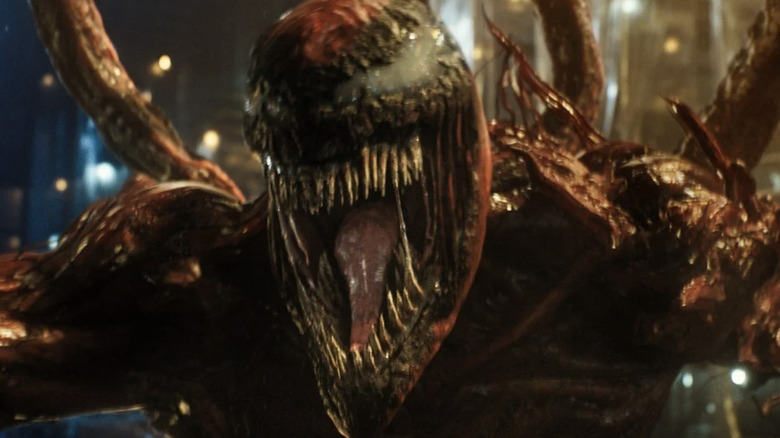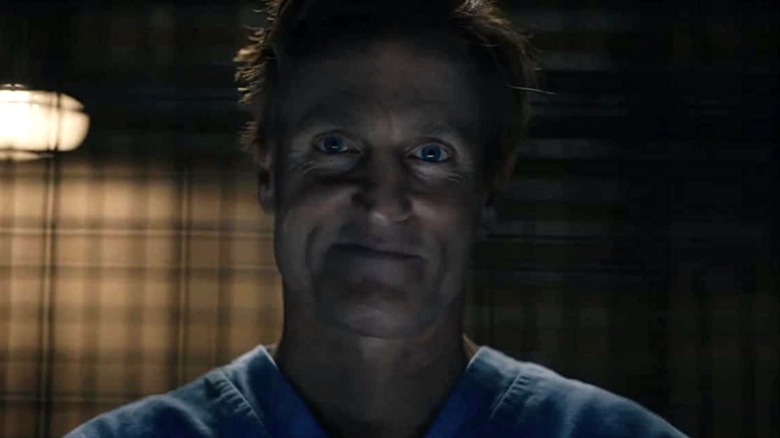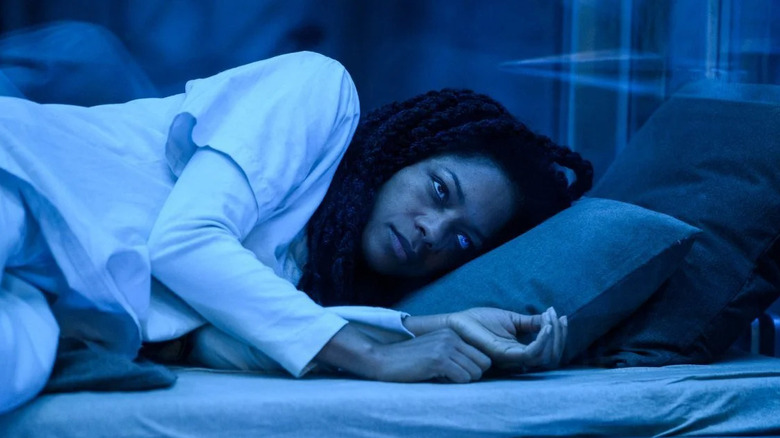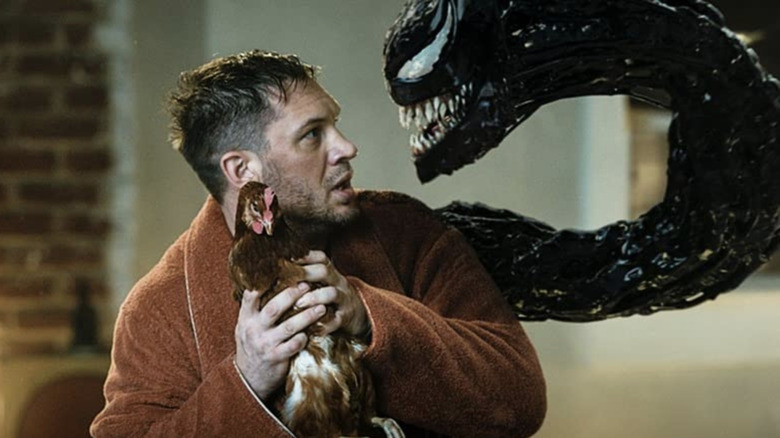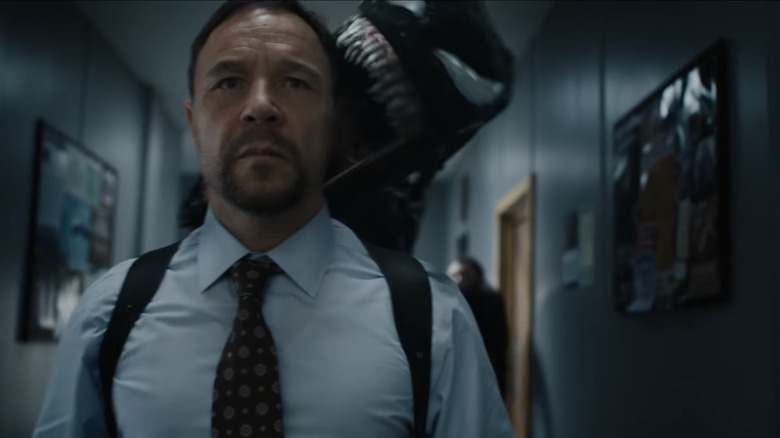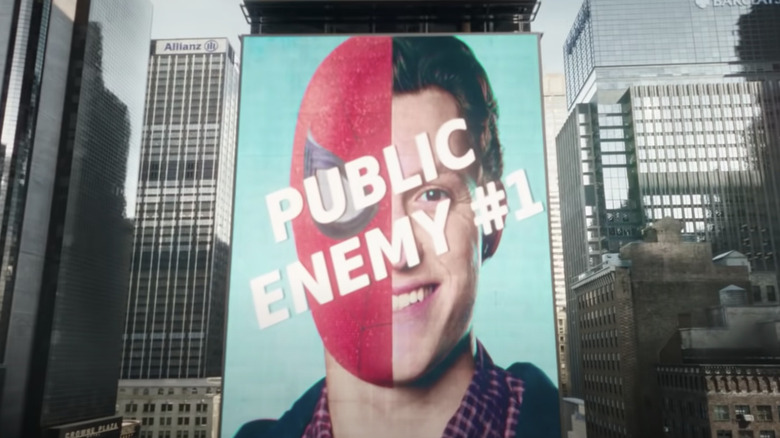Venom: Let There Be Carnage Ending Explained
Rarely has the ending of a movie had as much riding on it as the final moments of "Venom: Let There Be Carnage." The previous franchise film, 2018's freaky, frightful, Tom Hardy tour de force "Venom," spent its final moments introducing Woody Harrelson as Cletus Kasady, with the character promising: "When I get out of here, and I will ... there's gonna be carnage." Meanwhile, with "Spider-Man: No Way Home" promising a multiverse unleashed, hopes are high that Venom's original nemesis will once again cross paths with the symbiote. So will the sequel tease more symbiotes? Spidey? Both?
The immediate future of the Marvel Cinematic Universe seems to depend on the film, which also represents the latest offering from the sometimes-strained relationship between Sony (current holders of the Spider-Man film rights) and Marvel (the name that brought Spidey to life, and most recently, renewed relevance). If the two studios continue to share custody and play nice, we all benefit: Venom, Carnage, and Spider-Man could conceivably work their way into Avengers storylines, future Marvel movies, and every team-up and battle (Venom vs. Wolverine, anybody?) fans could hope to dream of. If they don't, well, Venom and friends will have to stay in their own little surreal sandbox.
With such stakes in mind, the time has come to stick out your tongue and take a big lick of the "Carnage" lollipop. Like its predecessor, the film is loud, violent, and off the wall in all the best ways — and its final moments dump more cliffhangers on you than a tipped-over Blockbuster shelf marked "Sylvester Stallone section."
So let's dig in and talk about the ending of "Venom: Let There Be Carnage." Obviously, many spoilers lie ahead. But if you aren't afraid to know the ending (and the mid-credits sequence), make like a symbiote and attach yourself to the words below.
People love a serial killer
At least, that's what Cletus Kasady believes — and with Woody Harrelson bringing the comic villain to life, it's hard to argue. But by the end of the film, Cletus has had Carnage run roughshod all over him, lost the only woman he has ever loved, and finally revealed his true motive: he just wanted to be Eddie's friend.
As Venom is quick to point out, that position is already filled. Which is most likely why, after nearly two hours of doing battle with him, Venom simply says "F*** this guy" and chomps off his head. Sorry, Cletus, it was fun while it lasted.
As for the issue of Carnage, a crawling ball of goo searching desperately for a new host, Venom takes care of that problem too. Scooping up the red sludge, Venom sucks it up like a Slurpee and exclaims: "He did not taste good."
In the comics, of course, Carnage is like a bad penny who just keeps turning up. But in the "Venom" franchise, at least for the foreseeable future, Cletus and Carnage both seem like they've taken that long, last trip to the distant cathedral.
Shriek of horror
Fans were thrilled to learn that not only would Frances Barrison be a key character in "Venom: Let There Be Carnage," but that she'd be brought to life by Naomie Harris, a veteran actor who has shined (and transformed herself) in films like "Skyfall" and the "Pirates of the Caribbean" series. They'll undoubtedly be thrilled, as the character more commonly known as Shriek features prominently throughout the film as the Bonnie to Kasady's Clyde (or perhaps more accurately, the new Mallory to Woody Harrelson's Mickey Knox), cackling with glee as the ill-fated lovers go on a super-powered killing spree.
By the end of the movie, however, the love triangle of Cletus/Frances/Carnage is beginning to show some strain. For starters, Shriek's main weapon is a brain-scrambling scream that doesn't pair well with symbiotes' sensitivity to high sonic energy. Every time Carnage seems to be getting into a groove, Shriek lets out a scream, knocking the big red guy off his game. This results in Carnage slapping Frances around a bit, much to the chagrin of her betrothed — but Cletus spends most of the movie's finale so deeply absorbed in Carnage that there isn't much he can do about it.
After she seemingly dispatches Detective Mulligan (Stephen Graham), Shriek has one final confrontation with the two symbiotes. Echoing early comic book appearances of Venom (and the assimilation of Eddie Brock), this smackdown involves a massive church bell whose every ring pummels the senses of the symbiotes. Knocked off her perch during the battle, Shriek falls to her death, letting out one final scream before she is presumably crushed by the massive bell.
Is this the end of Shriek? In a Marvel movie, does anyone ever truly see "the end"? While it's safe to say that if "Let There Be Carnage" is a hit they could probably figure out a way to resurrect the character, it's also likely that for the foreseeable future, Shriek has been silenced.
You say potato
A great deal of "Let There Be Carnage" concerns itself with the uneasy, highly non-traditional relationship between Eddie and Venom. Sharing a goal, an apartment, and a body, the duo undoubtedly get on each other's nerves, but need each other to survive and thrive.
By the end of the film, this odd couple seems to have finally made up. The immediate villains are gone, and they've turned their focus on the next adventure — one that will seemingly interact with "Spider-Man: No Way Home." But first, Venom needs some well-deserved R&R.
Perhaps not since the final scene of "The Shawshank Redemption" has it felt so good to watch two heroes frolicking together on a beach. Venom gets a chance to rub its toes ... um, tentacles? ... in the sand, and Eddie seems to be finally warming up to the fact that his life's companion is an enormous, head-chomping outer space monster that lives inside him.
Most importantly, Venom has indeed come out of the so-called "Eddie Brock closet" for good. The journalist seems more comfortable with letting his freak flag fly, as long as Venom does its best to only feast on those who really, really deserve it. So where does the "Lethal Protector" go next?
"Anywhere that needs a little protection, I suppose," says Eddie.
"We won't need a cape and a mask?" replies Venom.
"No," Eddie shoots back. "I think you've got that covered."
Taking a Mulligan
A key character in this film (and the only one whose hair comes even close to Cletus Kasady's for sheer implausibility) is Detective Mulligan, played by the always excellent, always intense character actor Stephen Graham (perhaps best known as Al Capone on "Boardwalk Empire"). In the opening scenes of "Carnage," we see a young Mulligan attempting to thwart an escape by Shriek, shooting her in the eye but nearly losing his life (and hearing) in the process.
Clearly, Frances Barrison knows how to hold a grudge — and does so for decades, as when she is finally freed from imprisonment and reunited with her lifelong love Kasady, she insists that Mulligan attend the ceremony that the pair refer to as "The Red Wedding." While Barrison and Kasady exchange their deranged vows, Mulligan spends most of the scene being held behind the altar, menacingly threatened by Carnage's tentacles.
Eventually, Mulligan does manage to free himself, ascending to the top of the church and attempting to radio for police backup. But that's when Shriek catches up with him, and the ensuing struggle has her finally pinning the detective to the ground and citing the old "eye for an eye" Bible verse as she presses a thumb into his peeper.
After the perceived death of Shriek, as the aftermath of the climax is realized, we see a very brief shot that not only indicates Graham is still alive, but that he might also now be super-powered. His eyes now glow blue, similar to Shriek, and he mumbles the word "monsters," referring back to the description offered by a prison inmate after Carnage broke Shriek out in an earlier scene.
What does this mean? Who could Mulligan become? Fans will undoubtedly spend the immediate aftermath of the film's release poring over possibilities, but perhaps we could start the conversation by throwing out one: Toxin.
In the 2004 Venom/Carnage crossover, Carnage created Toxin and it bonded with an NYPD cop named Patrick Mulligan. Mulligan ended up talking things out with Spider-Man and agreeing to try and harness the symbiote (who could be considered Venom's grandson) to fight crime, but eventually died, causing Toxin to latch on to Eddie Brock. Toxin is stronger than Venom, and at various times Venom has hoped he could make the symbiote into a relative good guy like him.
It's also well known that in the comics, Shriek can use her powers to simply turn people evil, so perhaps Mulligan is merely now an evil Mulligan. But it's that word, "monsters," that would seem to indicate something more toxic is at play.
Either way, here's hoping the tease doesn't result in another Dylan Baker situation. In the three Sam Raimi "Spider-Man" movies, the veteran character actor played Dr. Curt Connors and seemed headed down the path toward becoming the Lizard. By the time Andrew Garfield put on the Spidey suit, however, the role had been handed to Rhys Ifans instead. Baker (most recently seen in Amazon's "Hunters") never received his well-deserved moment in the spotlight, and fans were robbed of what could have been a much better baddie.
Spidey Sense
Perhaps the most significant revelation in the final moments of "Let There Be Carnage" comes for those brave souls who are willing to sit through a few hundred scrolling names to earn it. This mid-credit sequence depicts Venom and Eddie in a hotel room together, watching foreign language soap operas.
As the two begin exchanging thoughts on the show they're watching, Venom says "We all have a past, Eddie," furthering the quasi-romantic dynamic the two of them have, as if Venom is about to cough up the name of an old college fling. But instead, he makes a more intoxicating offer — what if he were to give Eddie Brock just the tiniest glimpse of all that's going through his superior brain?
"80 billion years of hive knowledge," Venom promises. "It would explode your brain."
Nevertheless, Eddie opts in. Once Venom begins the download, the room starts spinning, lights start flashing — and Eddie wakes up in a very different room, this one playing a different program on the television.
Sure enough, it's J. Jonah Jameson (J.K. Simmons), making his multiverse-shattering announcement that Spider-Man is really Peter Parker. Venom gets in close to the TV to take in the news, and when he sees Parker, he begins to lick the television. "That guy," says Venom, as if he's planning his next target.
"God help us all," responds a weary Eddie.
As fans have seen in the "No Way Home" trailer, Jameson's announcement is the catalyst for everything that happens in that film — causing Peter to seek out Doctor Strange, to tinker with reality, to open a multiverse that allows such threats as Doctor Octopus (Alfred Molina, from the Tobey Maguire movies) and Electro (Jamie Foxx, from the Andrew Garfield movies) to once again pose a threat. Of course, the Venom we see in these Tom Hardy films is a lot nicer than the character is typically portrayed — but even if he is putting the "hero" in anti-hero, it seems likely that Venom will not be approaching Spider-Man with a tentacle extended in friendship. At the very least, this mid-credits sequence establishes that this film's conclusion coincides with the "Far From Home" opening — which makes a crossover feel quite inevitable.
Oh, and this being a "Venom" movie, it can't end without a little off-the-wall humor. So when Eddie is finished beholding the future, a guy comes out of the bathroom and incredulously asks "Dude, what are you doing in my room?"
